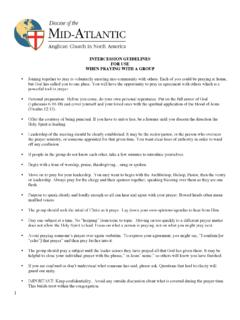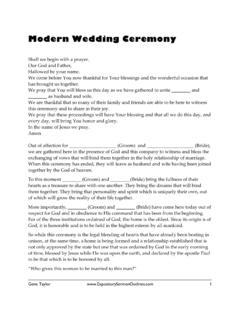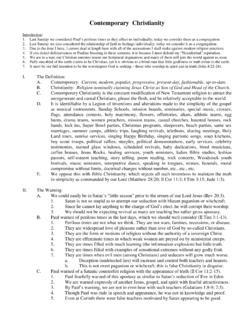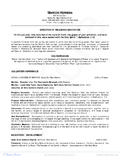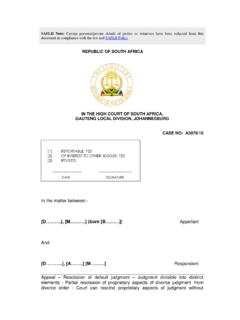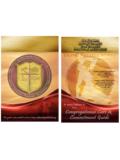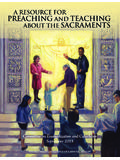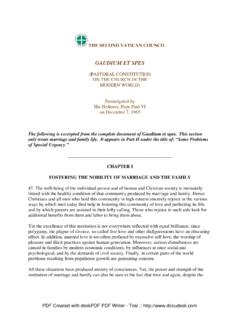Transcription of DOMA Marriage and Remarriage Policy Final
1 Policy on Christian Marriage and Remarriage Christian Marriage The Anglican Church in North America and the Diocese of the Mid-Atlantic affirm our Lord's teaching that the Sacrament of Holy matrimony is in its nature a union permanent and lifelong of one man and one woman .As Marriage is a lifelong covenant between a man and a woman in which the two become one flesh, it is both an ordinance of Creation, affirmed as such by our Lord, and commended by Saint Paul as a sign of the mystical union between Christ and His Church (Matthew 19:3-9; Ephesians 5:22-32) (Anglican Church in North America, Canon ). In asking that the Church solemnize their Marriage , the bride and groom declare their desire to enter a covenant relationship before God and in the presence of His people. They commit themselves to each other for the rest of their lives and invite Jesus Christ to be at the center of their Marriage .
2 In their intention to live their married life within the fellowship of the Church, they ask a priest to bless their commitment and the congregation to uphold them in prayer. They enter a Christian Marriage , hallowed by our Lord Jesus Christ, whose grace can sustain them to live together in love, joy and faithfulness. Marriage in the Anglican Church In order to be married in the Anglican Church in the Diocese of the Mid-Atlantic, a member of the clergy, canonically resident or licensed in the Diocese*, must preside at the wedding. This officiant is the agent of both the State and the Church and is bound by the laws of the State**. as well as The Book of Common Prayer and the Canons of the Church. These obligations require the officiant to ascertain the couple's ability and readiness rightly to enter into Marriage . The officiant must ensure that they understand the nature, meaning and purpose of Holy matrimony and that they are aware that they are entering into a lifelong covenant of physical and spiritual union.
3 Eligibility to Be Married in the Church It shall be within the discretion of any member of the clergy to decline to solemnize any Marriage (Canon ). A member of the clergy must decline to preside at any Marriage that he or she believes should not take place. * An Anglican priest who is neither canonically resident nor already licensed in the Diocese of the Mid-Atlantic should contact the Bishop's office to obtain permission to officiate at a wedding in a church of the Diocese. ** The officiant must conform to the licensing requirements of the State in which the wedding takes place. See Appendix 3, Laws Concerning Marriage Officiants, by State.. Both bride and groom must be baptized. Any exception to this requires the officiant to obtain the permission of the Bishop. The officiant shall provide counsel to both parties on Holy matrimony with respect to theological and social implications and responsibilities.
4 Clergy are strongly urged to utilize trained lay couples who can assist in preparing couples for Marriage . In the Diocese of the Mid-Atlantic it is expected that this period of preparation shall be at least four months in length, following which, with the permission of the member of the clergy, invitations to the wedding and other public announcements may be sent. If the officiant waives this requirement for weighty reasons, the Bishop shall be notified immediately and in writing. The officiant shall require the parties to sign the following declaration: We, A. B. and C. D., desiring to receive the blessing of Holy matrimony in the Church, do solemnly declare that we hold Marriage to be a lifelong union of husband and wife as it is set forth in the Book of Common Prayer. We believe it is for the purpose of the procreation (if it may be) of children, and their spiritual and physical nurture, for mutual fellowship, encouragement, and understanding, and for the safeguarding and benefit of society, and we do engage ourselves, so far as in us lies, to make our utmost effort to establish this relationship and to seek God's help thereto.
5 The officiant shall ascertain that the bride and groom have a valid Marriage license. In all cases, marriages shall be solemnized according to the forms contained in an authorized Book of Common Prayer, or other rite authorized by the Bishop. The Clergy shall record in the church's register the name, age, and residence of each party. Such record shall be signed by the member of the Clergy, the married parties, and at least two adult witnesses. No Clergy knowingly, after due inquiry, shall solemnize any Marriage if they have unresolved concerns regarding the following impediments: (a) Consanguinity and affinity as defined in the 1662 Book of Common Prayer;. (b) Mistaken identity or surgically altered sex;. (c) Absence of the capacity for free and intelligent choice;. (d) Bigamy, evidence of sexual perversion or conviction of a sexually related crime.
6 (e) Fraud, coercion, abuse or duress. Remarriage After Divorce The failure of a Marriage is always a tragedy, reflective of human brokenness and sin. Scripture acknowledges our fallen nature and does provide guidance to know when a Marriage may be declared a nullity or dissolved and allows the possibility of a subsequent Marriage in certain circumstances, such as adultery or abandonment by the former spouse (see Matthew 19 and 1. Corinthians 7; Canon ). When a divorced person seeks permission to remarry, the officiant must ascertain the pertinent facts concerning a declaration of nullity or termination of Marriage ; and in the absence of a declaration of nullity, if either party has been married previously and the Marriage ended in divorce, the officiant must submit to the bishop for approval of the new Marriage at least 45 days prior to the proposed wedding date a completed Petition to the Bishop for Consent to Solemnize a Marriage after Divorce (Canon ).
7 Permission can be expected from the Bishop when the following criteria are met: there has been no more than one divorce (or annulment) for either the bride or the groom;. the Marriage did not end because of adultery committed by a person now seeking permission to remarry;. there has been sufficient time since the end of the previous Marriage (s) to allow for healing; this normally means that one year will have elapsed between the date of the Final divorce decree(s) and the date of application to the Bishop. care for any children and, if appropriate, the ex-spouse have been provided;. there is demonstrated repentance for the individual's role in the break-up of the previous Marriage (even if the person did not commit adultery, there are always ways in which the person sinfully contributed to the break-up);. there is an understanding of the biblical teaching about Marriage and divorce (including the appropriateness of divorce only on biblical grounds) and a commitment to live under biblical principles in this Marriage .
8 It would not cause scandal or offense within the congregation;. the previous spouse is not still in the same congregation;. the other normal provisions for first marriages would be met (there has been adequate preparation, there is emotional and spiritual readiness to enter into the Marriage , etc.). both bride and groom are baptized, committed to Christ and are active members of a church. If there have been two divorces for either or both parties, the norm in the Diocese of the Mid- Atlantic is for a civil Marriage to be held in another location apart from the church's regular worship space. After a year of testing of the fruit of the Marriage , a blessing of the civil Marriage (without all the trappings of a typical wedding) could be held in the church with the permission of the Bishop, using the form, Petition to the Bishop for Consent to Bless a Civil Marriage after Divorce.
9 In extraordinary circumstances, the officiant may petition the Bishop to waive this and permit a third Marriage in the church; in such a situation, the officiant is advised to consult with the Bishop well in advance, since the Bishop may require additional steps, such as an assessment by a professional counselor, which will need to be completed prior to the Bishop making his determination. Appendix 1. Excerpts from The Canons of the Anglican Church in North America Title II, Canon 7. Of Christian Marriage Section 1 - The Anglican Church in North America affirms our Lord's teaching that the Sacrament of Holy matrimony is in its nature a union permanent and lifelong of one man and one woman. Section 2 - It shall be within the discretion of any member of the Clergy to decline to solemnize any Marriage . Section 3 - Members of the Clergy of this Church shall conform to the Canons of this Church governing the solemnization of Holy matrimony .
10 1. Both parties shall be baptized. Any exception to this requires the permission of the Bishop;. 2. There shall be thirty (30) days notice of intention to marry unless waived for weighty reasons, in which case the Bishop shall be notified immediately and in writing;. 3. The Clergy shall provide counsel to both parties on Holy matrimony with respect to theological and social implications and responsibilities;. 4. The Clergy shall ascertain that the man and woman, parties to the Marriage , have a valid Marriage license. Section 4 - As Marriage is a lifelong covenant between a man and a woman in which the two become one flesh, it is both an ordinance of Creation, affirmed as such by our Lord, and commended by Saint Paul as a sign of the mystical union between Christ and His Church (Matthew 19:3-9; Ephesians 5:22-32). Therefore, the failure of a Marriage is always a tragedy.
